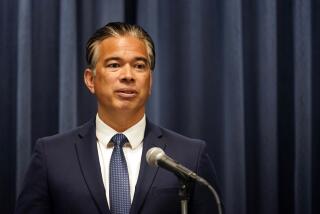Nearly 500 Investors Claim Fraud in Tax Shelter Plan
Nearly 500 investors, including major league baseball players Rick Sutcliffe, Frank Tanana and Shane Rawley, are suing North Hollywood businessman Gerald L. Schulman for securities fraud, claiming that they are among 4,000 people nationwide who invested $200 million in a fraudulent tax shelter scheme Schulman devised.
The suit alleges that investors in real estate limited partnerships organized and promoted by Schulman from 1977 to 1985 have lost or will lose $200 million in tax deductions disallowed by the U.S. Internal Revenue Service.
The lawsuit, filed Friday in U.S. District Court in Newark, N.J., alleges that investors were enticed to buy into real estate limited partnerships that would own post offices and public utility buildings that would be leased to the government and other tenants. The suit seeks to recover the $200-million investment, plus $500 million in punitive damages, as well as removing Schulman as general partner for the real estate partnership and to have a receiver appointed by the court to take over the business.
Schulman’s privately held Postal Management Services firm in North Hollywood claims to be the largest manager of U.S. Postal Service, telephone, state and federal buildings. According to one 1986 company report obtained by The Times, Postal Management Services manages buildings worth about $950 million and controls about 10% of the gross rents paid by the Postal Service.
Gary Meyers, a New Jersey attorney who represents the investors, said that the case is one of the largest securities fraud cases ever involving tax shelters in both number of investors and the amount invested. Each investor put up from $20,000 to as much as $800,000, he said, to buy part of Schulman’s partnerships.
Schulman’s attorney, Bruce I. Hochman, said the lawsuit is without merit.
He said that the investment money ultimately went toward the purchase of buildings, adding that the dispute with federal officials is basically over whether the payments for tax reasons should be considered down payments on properties or tax-deductable interest payments.
The investors allege that they were told the payments were tax deductible because, although they were buying the properties, the money was technically used to pay interest on short-term loans purportedly used to buy buildings.
Instead, investors and federal prosecutors allege, the loans were never made. They say Schulman and his associates, through a series of check swaps through bank accounts in Holland and Panama, created the illusion that interest payments were being made.
Little is known about Schulman, 55, an accountant who is scheduled to go to trial Nov. 10 in U.S. District Court in Los Angeles for 20 counts of criminal tax fraud.
Schulman was indicted by a federal grand jury in March, 1986, on the charges, which stem from 91 of the partnerships he promoted. The charges were dismissed in June, 1986, by U.S. District Court Judge Marianna R. Pfaelzer, but reinstated last May by the 9th U.S. Circuit Court of Appeals, although it upheld the dismissal of two perjury counts.
Hochman further contends that depreciation on the buildings purchased will be allowed by the IRS, that there were no penalties assessed on investors, and that after the properties are sold, deductions will also be allowed by the IRS that will offset potential gains.
“There is nothing in my judgment here that is Machiavellian,” Hochman said.
But Meyers said that the IRS has disallowed the key incentive for investors, a big tax writeoff in the first year that the partnerships were bought.
According to the New Jersey lawsuit, Schulman was disbarred as an attorney in New York in 1969, had his accounting license suspended in California for two years in 1973 and filed for personal bankruptcy in Los Angeles in 1970.
None of those problems was disclosed to investors in an offering circular, the suit claims. Hochman said that he could not comment on those allegations.
Investors were primarily doctors, lawyers and wealthy executives, attorneys said. According to court records and attorneys, however, the 477 plaintiffs in the lawsuit include five major league baseball players: utility man Lee Mazzilli of the New York Mets and pitchers Rick Rhoden of the New York Yankees, Sutcliffe of the Chicago Cubs, Tanana of the Detroit Tigers and Rawley of the Philadelphia Phillies.
More to Read
Inside the business of entertainment
The Wide Shot brings you news, analysis and insights on everything from streaming wars to production — and what it all means for the future.
You may occasionally receive promotional content from the Los Angeles Times.










